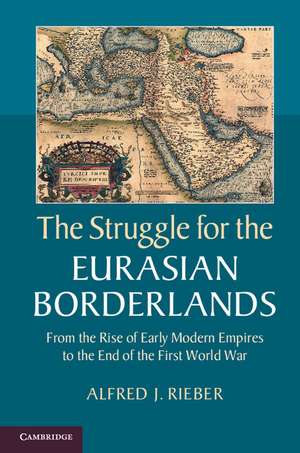The Struggle for the Eurasian Borderlands: From the Rise of Early Modern Empires to the End of the First World War
Autor Alfred J. Rieberen Limba Engleză Hardback – 19 mar 2014
| Toate formatele și edițiile | Preț | Express |
|---|---|---|
| Paperback (1) | 332.66 lei 6-8 săpt. | |
| Cambridge University Press – 19 mar 2014 | 332.66 lei 6-8 săpt. | |
| Hardback (1) | 775.72 lei 6-8 săpt. | |
| Cambridge University Press – 19 mar 2014 | 775.72 lei 6-8 săpt. |
Preț: 775.72 lei
Preț vechi: 902.00 lei
-14% Nou
Puncte Express: 1164
Preț estimativ în valută:
148.45€ • 153.36$ • 123.55£
148.45€ • 153.36$ • 123.55£
Carte tipărită la comandă
Livrare economică 25 martie-08 aprilie
Preluare comenzi: 021 569.72.76
Specificații
ISBN-13: 9781107043091
ISBN-10: 1107043093
Pagini: 652
Ilustrații: 12 maps
Dimensiuni: 152 x 229 x 35 mm
Greutate: 1.18 kg
Ediția:New.
Editura: Cambridge University Press
Colecția Cambridge University Press
Locul publicării:New York, United States
ISBN-10: 1107043093
Pagini: 652
Ilustrații: 12 maps
Dimensiuni: 152 x 229 x 35 mm
Greutate: 1.18 kg
Ediția:New.
Editura: Cambridge University Press
Colecția Cambridge University Press
Locul publicării:New York, United States
Cuprins
Introduction; 1. Imperial space; 2. Imperial ideologies: cultural practices; 3. Imperial institutions: armies, bureaucracies and elites; 4. Imperial frontier encounters; 5. Imperial crises; 6. Imperial legacies; Conclusion: transition.
Recenzii
'A compelling demonstration of the central importance of borderlands and frontier disputes in Eurasian states. Its broad comparative sweep provides insights not only into the sources on international conflict, but also into the dynamics of internal reform enacted to bring borderlands more effectively under central control.'3 Richard S. Wortman, Bryce Professor Emeritus of European Legal History, Columbia University
'This volume is an impressive feat of dedicated scholarship. Employing a mode of analysis that he calls 'geo-cultural', Alfred J. Rieber interprets the political and social history of Eurasia as a story in which certain frontiers play an absolutely essential, indeed informative role. It is safe to say that people who read this book will never see frontiers in the same way as before.' Ilya Vinkovetsky, Associate Professor of History, Simon Fraser University
'No-one who reads this book can fail to gain new perspectives on much of modern history, not to mention the constant crises of both Europe and Asia today.' The Times Literary Supplement
'Borderlands are back. From the Baltic to the Balkans, from Ukraine and the Caucasus through Central Asia, old fault lines from old empires have once again taken on political relevance in world politics. Alfred J. Rieber's ambitious book looks at their formation and interaction with five imperial centers over five centuries through a study of the Habsburg, Ottoman, Russian, Iranian, and Chinese empires.' Thomas J. Barfield, American Historical Review
'[Rieber] has produced an encyclopedic political history of mid-fifteenth- through twentieth-century Eastern Europe and much of Asia (except for the Arab and Indian worlds), with many forays into the Middle Ages and an emphasis on the period since 1815. The book includes an imposing wealth of factual material and comparisons, and a vast array of footnotes covering secondary literature in many languages on practically every important question related to the rise and decline of empires.' Seymour Becker, Ab Imperio
'What is new about this book is a holistic vision of patterns of conflict determined by the existence of complex, interconnected and fluid frontiers … In its broad territorial and chronological span as well as its rich tapestry of historical detail, the book is written in the worthy tradition of the École des Annales … This should become a standard work, equally insightful for the academic specialist and for students of history.' Irina Marin, The English Historical Review
'This is an impressive, complex, and comprehensive work that reflects a lifetime of scholarly study. It is also a study that focuses on borderlands within continental empires that, at least in the historiography of the modern era, tend to play a subordinate role to European overseas empires. For this reason alone, it is a refreshing approach to the broader subject of empire and borderlands.' Jonathan E. Gumz, Journal of Modern History
'This volume is an impressive feat of dedicated scholarship. Employing a mode of analysis that he calls 'geo-cultural', Alfred J. Rieber interprets the political and social history of Eurasia as a story in which certain frontiers play an absolutely essential, indeed informative role. It is safe to say that people who read this book will never see frontiers in the same way as before.' Ilya Vinkovetsky, Associate Professor of History, Simon Fraser University
'No-one who reads this book can fail to gain new perspectives on much of modern history, not to mention the constant crises of both Europe and Asia today.' The Times Literary Supplement
'Borderlands are back. From the Baltic to the Balkans, from Ukraine and the Caucasus through Central Asia, old fault lines from old empires have once again taken on political relevance in world politics. Alfred J. Rieber's ambitious book looks at their formation and interaction with five imperial centers over five centuries through a study of the Habsburg, Ottoman, Russian, Iranian, and Chinese empires.' Thomas J. Barfield, American Historical Review
'[Rieber] has produced an encyclopedic political history of mid-fifteenth- through twentieth-century Eastern Europe and much of Asia (except for the Arab and Indian worlds), with many forays into the Middle Ages and an emphasis on the period since 1815. The book includes an imposing wealth of factual material and comparisons, and a vast array of footnotes covering secondary literature in many languages on practically every important question related to the rise and decline of empires.' Seymour Becker, Ab Imperio
'What is new about this book is a holistic vision of patterns of conflict determined by the existence of complex, interconnected and fluid frontiers … In its broad territorial and chronological span as well as its rich tapestry of historical detail, the book is written in the worthy tradition of the École des Annales … This should become a standard work, equally insightful for the academic specialist and for students of history.' Irina Marin, The English Historical Review
'This is an impressive, complex, and comprehensive work that reflects a lifetime of scholarly study. It is also a study that focuses on borderlands within continental empires that, at least in the historiography of the modern era, tend to play a subordinate role to European overseas empires. For this reason alone, it is a refreshing approach to the broader subject of empire and borderlands.' Jonathan E. Gumz, Journal of Modern History
Notă biografică
Descriere
A major new account of the Eurasian borderlands as 'shatter zones' which have generated some of the world's most significant conflicts.

















